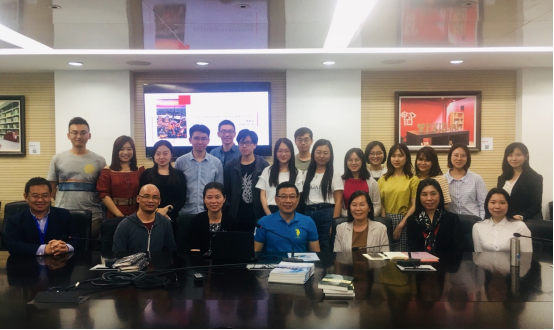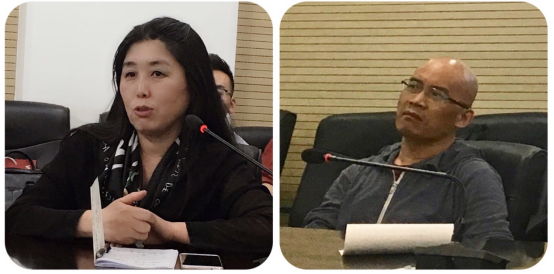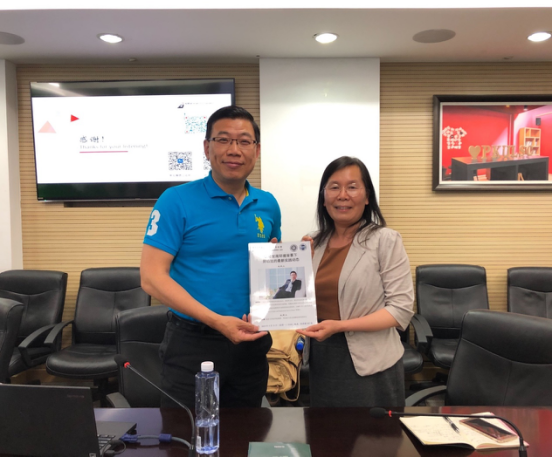The 60th lecture of Peking University Social Law Forum Series was successfully held
Date:2019-05-27
At 7:00 pm on May 13th, 2019, the Theme Lecture "Optimizing the Latest Practices of Labor Law in the Background of Business Environment" sponsored by the Institute of Labor Law and Social Security Law of Peking University and the lecture series of Peking University Social Law Forum No. 60 Successfully held in Room 307 of (Leo) Koguan Building. Lu Jingbo, chief partner and director of the Shanghai Jiang Triangle Law Firm, was the keynote speaker. Ye JingYi, director of the Institute of Labor Law and Social Security Law of Peking University, was the moderator. Zhao Hongmei, director of the Institute of Social Law, School of Civil and Commercial Economics, China University of Political Science and Law, Tao Wenzhong, director of the Labor Relations Research Center of the Capital University of Economics and Business, are commentators.

First of all, Prof. Ye Jingyi delivered a welcome speech. She expressed gratitude to Lu Jingbo for his support to Peking University's social law discipline and briefed Lu Jingbo on his lawyer. Mr. Lu Jingbo has extensive experience in labor, personnel and corporate related legal business. He founded China's first online platform for labor legal services and founded China's first enterprise HR practical journal, Labor Law Court.
Subsequently, Mr. Lu Jingbo began to explain the nine aspects of “the latest practice dynamics of the labor law under the background of the business environment”. First, cut in the three aspects of empowerment stock, expansion increment and total revitalization, and increase the supply of human resources. Second, from the "standard" of labor relations, emphasizing flexible employment methods; third, from adjusting the position of salary adjustment, flexible working hours, dismissal of staff, establishment of rules, democratic management, and expansion of enterprise autonomy Fourth, rationally design a non-competition and service period system to ensure the safety of corporate assets and strengthen the “security sense” of enterprises; fifth, pay attention to wages, social insurance premiums, unpaid wages, economic compensation, and control labor costs; Sixth, focus on assisting development, serving employees, shifting the focus of the three aspects, and coordinating the functions of trade unions; seventh, strengthen integrity, rationally handle unauthorized work stoppages, gather people to make troubles, and standardize employee behavior; eighth, improve judicial interpretation and guidance cases at the national level. And local level of ruling opinions, typical cases, unified law application; ninth, from source prevention, diversified solutions, standardization. Taking into account the four-level optimization dialectical dispute governance.
In the interactive section, Lawyer Lu Jingbo and his classmates discussed in depth the "labor forces in collective bargaining", "the challenge of artificial intelligence to labor law" and "legal issues in the employment of college students".

Lecturer, Lu Jingbo
Later, Prof. Zhao Hongmei and A.P. Tao Wenzhong conducted a review. Prof. Zhao Hongmei pointed out that labor legislation is related to people's livelihood and should be prudently based on the knowledge and actual conditions of comprehensive management and law. At the same time, we must pay attention to the judicial and law enforcement links and systematically play the role of labor law. A.P. Tao Wenzhong mainly reviewed the history of China's labor legislation and emphasized the importance of labor legislation to optimize the business environment.

Commentator, Prof. Zhao Hongmei (left), A.P. Tao Wenzhong (right)

Prof.Ye Jingyi presented a memorial poster to Lu Jingbo
Finally, Prof. Ye Jingyi summed up and presented a commemorative poster to Lu Jingbo, and the lecture ended satisfactorily in a warm atmosphere. The lecture gave students a clear understanding of the latest practices in the labor law in the context of optimizing the business environment, which led to many reflections on the frontier issues in the field of labor law.
Translated by: Jiang Lu
Edited by: Rosie



